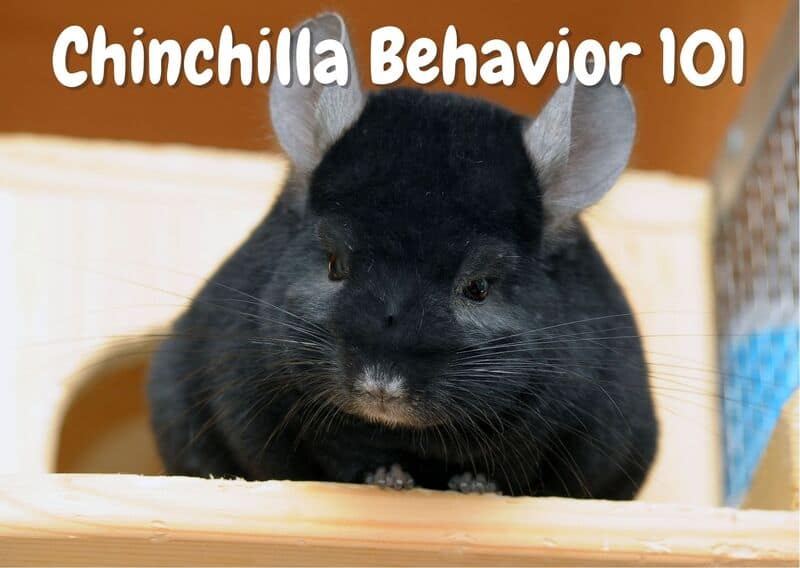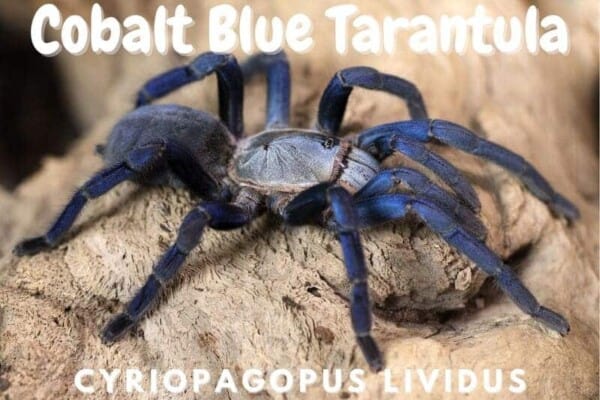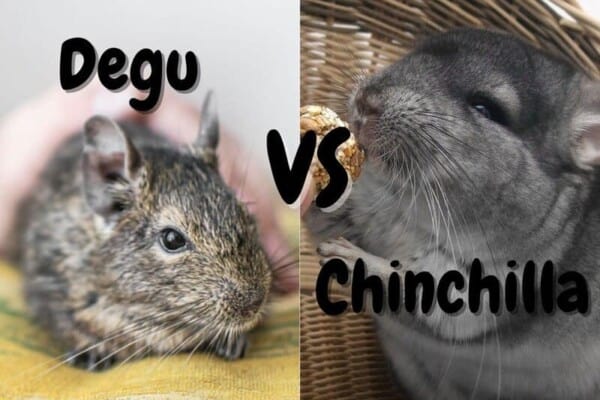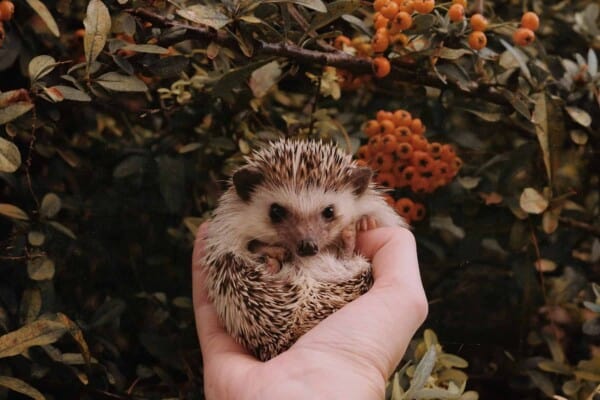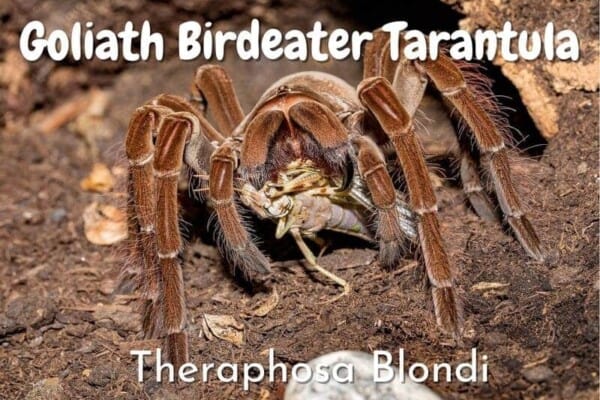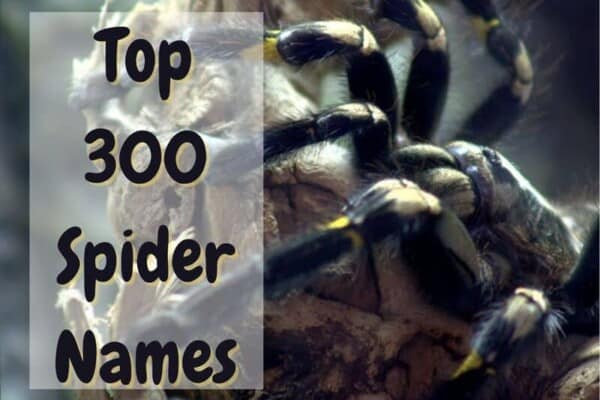Chinchillas have a wide range of behaviors and emotions that they communicate to owners and other chinchillas. This is done through sounds and actions which allow you to see what they want to tell you. If you want to learn to be a chin-whisperer, this guide will give you plenty of behaviors that you can learn to decypher.
| Happy Chinchilla Behavior | Unhappy Chinchilla Behavior | Chinchilla Sounds |
|---|---|---|
| Smiling | Poop throwing | Grunting |
| Winking | Rearing up | Barking |
| Tail wagging | Hair sticking up | Squeaking |
| Wall surfing | Biting | Shrieking |
| Jumping around | Biting fur | |
| Standing up tall | Somersaulting | |
| Staring | Pacing in circles | |
| Pop corning | Chewing cage | |
| Whiskers spread out | Repetitive movements | |
| Nibbling hand | Aggressive to others | |
| Doesn’t like dust bath powder | ||
| Whitish eye goop |
Happy chinchilla behavior and body language
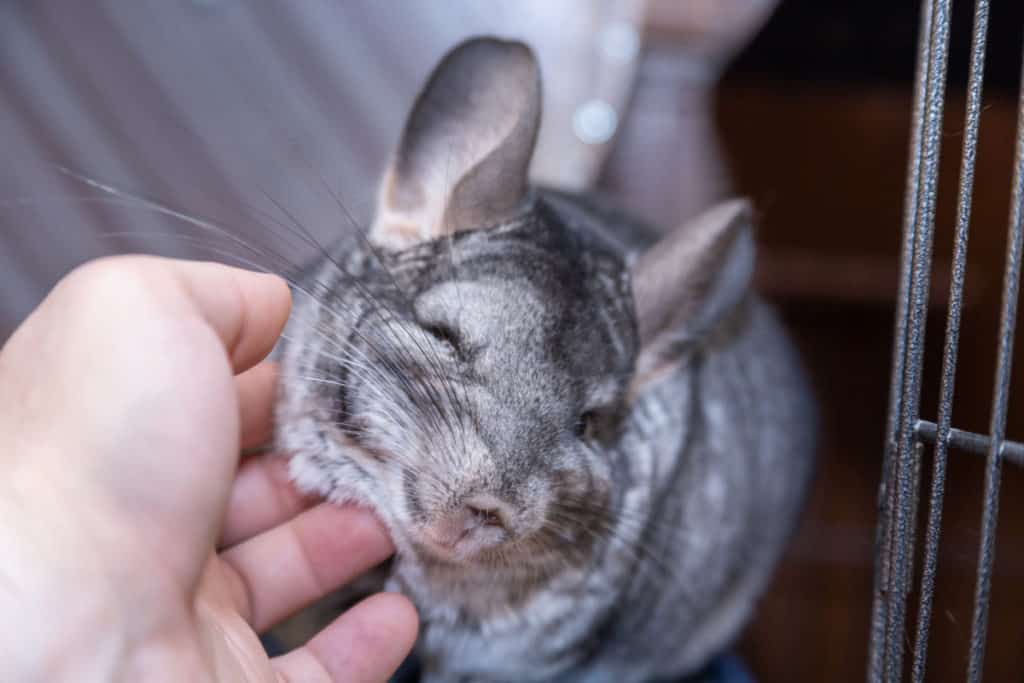
1. Smiling
Among some of the rare things that will let you know that your chinchilla is very happy is giving a smile. It’s unmistakable how they curl their cheeks upward in contentment. It can be from being combed, touched, and simply being happy. Scratching under their chin will also trigger this smile.
2. Winking
You’ll know when your chinchilla is responding to you by giving winks or blinks. This is part of their bonding that allows you to know when they’re listening to your voice. Almost as if they’re telling you they agree or saying yes. It’s the best gratification to see them respond to you without ever saying a word.
3. Tail wagging
This is learned from an early age with a chinchilla asking to be picked up. It’s also something that males will do around females who are ready for mating as a part of a mating ritual. It is also a sign of tolerance when it comes to sharing snacks.
4. Wall surfing
This is when a chinchilla runs toward a wall or door and jumps at an angle slipping off the surface in an energetic thud. They are exciting and happy, but some experts believe this is a dominance being shown. They will squeak loudly or softly but the unmistakable wall surfing action is part of their pure excitement of being out of their cage.
5. Jumping around
When you enter the room and your chinchilla sees you, if they are jumping it means that they are excited to see you. This can include running around their cage, up and down their stairs, or hopping happily and playfully.
6. Standing up tall
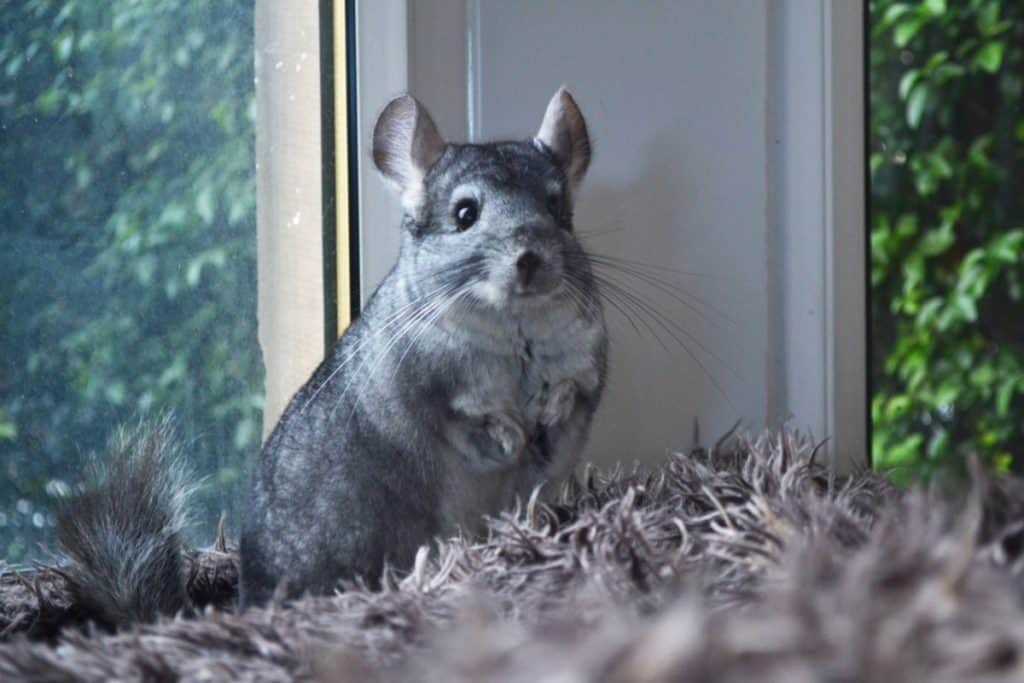
Standing on their hind legs is a sign they are curious and excited to see what is happening. It sometimes means that they are perceiving some danger or something threatening, but not always. In most cases, they simply want to see what’s going on.
7. Staring
Most of the time your chinchilla will be excited to see you enter the room and their stare will be wide-eyed. This means they are wide awake and ready for action. This can be because they are excited to play, eat, or come out of their cage.
8. Pop-corning
This is a characteristic single jump in the air with a jerking motion at the very end. Many chinchillas are very adept at jumping, yet this response is a positive one rather than anything negative.
9. Whiskers spread out
One interesting friendly mood is a chinchilla that has its whiskers spread out and poking everywhere. Chinchillas have very long whiskers that will extend outwards as they pull them inward. This is another curious and friendly gesture they do when they are happy or excited.
10. Nibbling hand
This is mainly a grooming characteristic that a chinchilla likes to do for its owners. It’s a sign of affection that is traded back and forth between chinchillas. If they are doing this to your fingers or skin with little nibbles, it means they are just fine.
Behavior and body language of an unhappy chinchilla
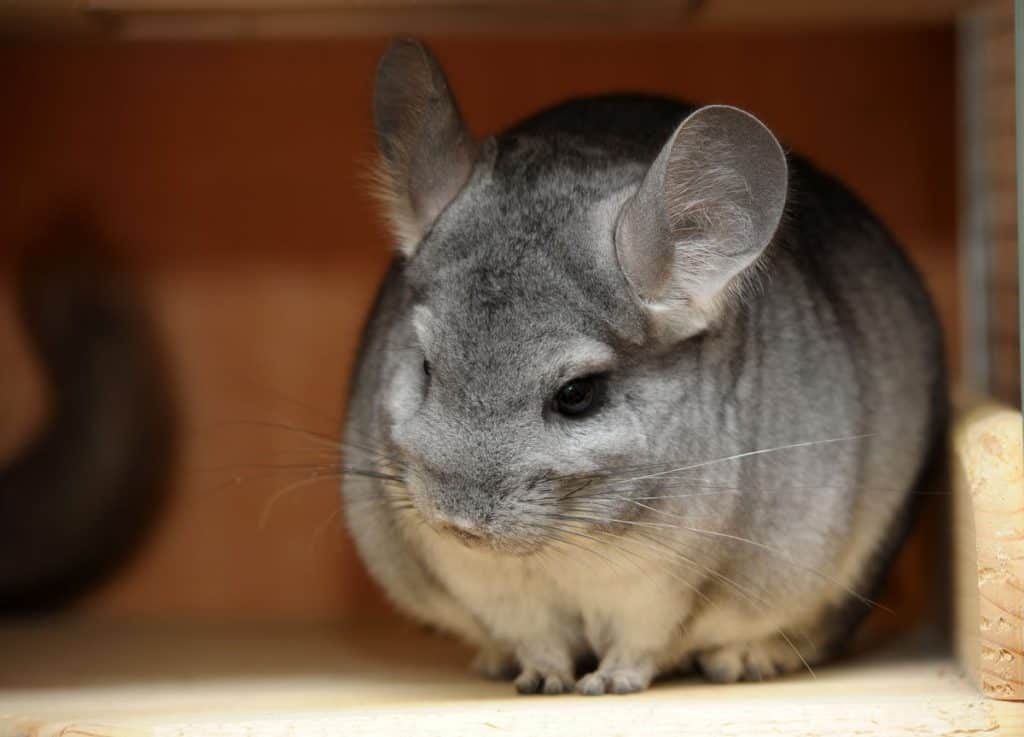
11. Poop throwing
Chinchilla care is not always a walk in the park. Poop throwing is surely a sign that you should not approach your chinchilla, as something is agitating or stressing them. Throwing poop can tell you a bit about their disposition. If they are throwing poop, do not try picking them up. They might give a warning growl or even try to bite you.
12. Rearing-up
This is threatening behavior that tells you they are getting ready to fight. They can make audible noises that include teeth chattering and growling. If they do this with you or others, this is a sign they feel threatened and that anyone around should back off.
13. Hair sticking up
Just like a dog will raise the hair on its back, so does the hair on a chinchilla. Only in this case, this means your chinchilla is not very happy to be bothered. They are stressed and don’t want you to touch them or pick them up. It’s certainly a defensive warning sign.
14. Biting
Getting bitten by a chinchilla is not a pleasant experience since they can bite hard enough to pierce the skin. They do test your skin from time to time, but not on purpose unless they are telling you to not keep touching them. Any chinchilla that has bitten you before may not learn to stop biting which can lead to an ongoing aggressive problem.
15. Biting fur
This is a sure sign that your chinchilla is stressed and has some anxiety issues. This is a hard habit to break but can be linked to bad diets and simple boredom. Keeping your chinchilla busy with a good cage setup will help them to stop chewing off clumps of fur.
16. Somersaulting
This is a bad sign that tells you that a chinchilla is full of anxiety and has neurotic issues. The problem can start with a cage that is too small for them to move around.
17. Pacing in circles
Another sign that a chinchilla needs plenty of space will result in odd behavior like this. It is not normal if they are racing and walking in circles. Let your chinchilla behavior calm down and watch for signs they are doing better. Offer their food and snacks and make sure they are eating, as this could be a hunger issue. If they are unhappy because of space, get them a larger cage.
18. Chewing cage
This could be a sign that they don’t have anything good for gnawing. They are also doing this from boredom and wanting attention. In some cases, it may also be from behavior that’s a neurotic problem. Check the temperature of the room, as it might be a sign they are too hot.
19. Repetitive movements
This is certainly a sign that is showing you they are bored and need some attention. Keep them busy by playing with them or giving them the right toys.
20. Aggressive to others
Any chinchilla that is attacking others in the cage needs to be taken out and separated. This aggression can be harmful and result in fur slippage, fur biting, and stress for others. It can be from an adult that is showing aggression through extreme Alpha males or overly aggressive females.
Boredom and aggressive natures can be controlled as long as you carefully curb your chinchilla behavior slowly. This will require having a second or third cage to control these issues.
21. Doesn’t like dust bath powder
You might not think a chinchilla is going to be finicky about dust bath powder, but they can react badly to some brands. The kinds of brands that add colors and powders for scent can actually be allergic and bother their eyes. It can also happen if you change brands suddenly. When it comes to products they get used to, it takes gradual changes that are not such a shock for them to handle.
Some signs of distress in chinchillas
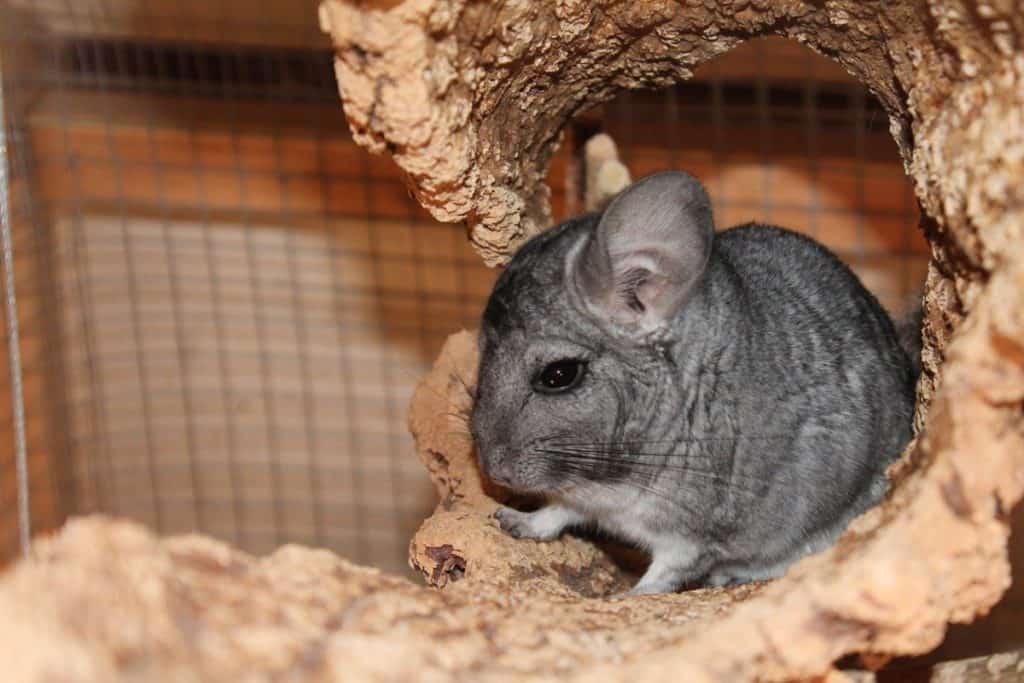
22. Whitish eye goop
This is a bad sign that can be from dental issues or perhaps from a respiratory problem. The wrong type of dust bath powder can cause this to happen. It can also be a simple eye infection, so in any case, you will need to take your chinchilla to the vet ASAP.
23. Weakness
Chinchillas are mainly nocturnal, but if your pet is not being very active due to lack of exercise, it can lead to acute shock and seizures. Sadly to say that boredom issues are common for chinchillas and they need lots of activities that keep them busy. Overeating and becoming overweight will also be a problem that leads to a lack of exercise.
24. Weight loss
Watch for weight loss or your chinchilla getting too skinny. This can be done by looking at how much they poop and pee and also how much they are eating each day. If they are stressed, they will stop eating completely, which is a big life-threatening danger.
25. Sickness
Chinchillas aren’t going to get sick from viruses that other animals usually suffer from. It is often from the neglect that goes with not spending enough time with them. Their cage is also another reason they’ll get sick if it is too dirty.
Understanding chinchilla dominance behavior
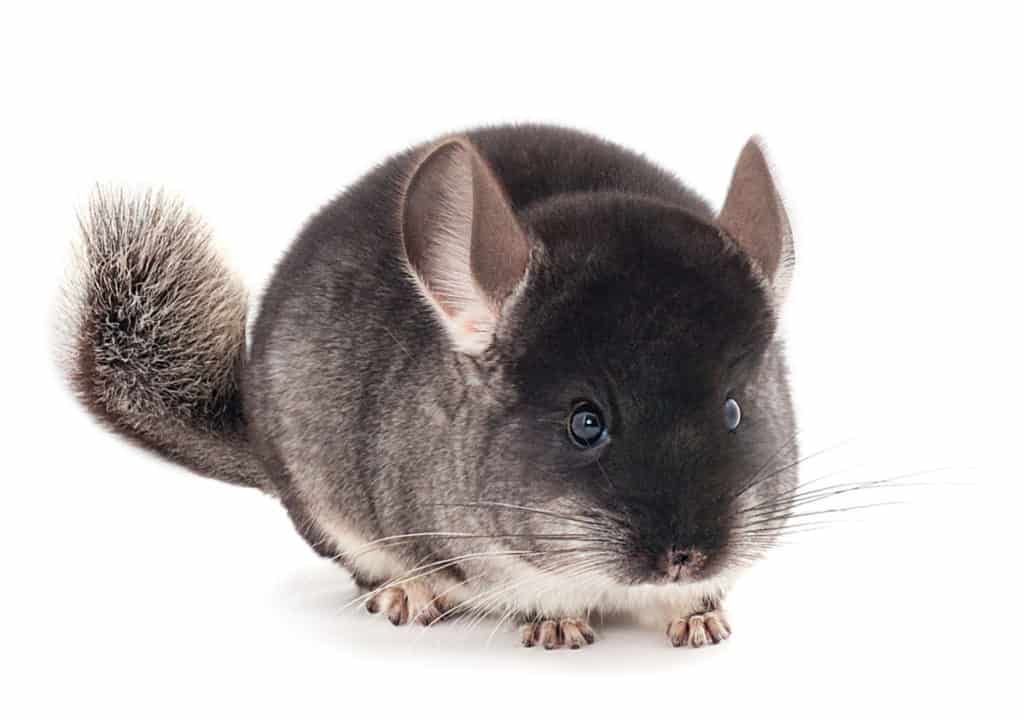
Alpha males
Most people think that Alpha males among the chinchilla circle are very aggressive but this is generally not the case. The females are more aggressive than males until the males start to exhibit extreme behavior. Most males are not showing overt Alpha male attitudes until they reach full maturity after 7 or 8 months.
Extreme Alpha males
When you do have feisty males they will be showing aggressive mounting. This can even happen to your hand since he is in hot hostile pursuit of mating action. You will see them cornering, teeth chattering, urine spraying, and releasing a scent to entice the females to mate.
Betas Males
Other Beta males just won’t stand up to their buddies, since they might be over bullied or too scared to try fighting for dominance. They also might not be mature or have not reached full maturity just yet. So these younger and less experienced males will take the Beta position.
Female dominance
Females are surprisingly aggressive in a group with other females. You might call this subordination, but it happens more often even when the female has not reached maturity. Many owners will simply trim their whiskers off to remove this aggressive nature.
Pregnant behavior
You don’t see much difference when a female chinchilla is pregnant since they are naturally larger than males. You will see signs she is pregnant with mood swings and more attitude-behavior changes. One sure sign that tells you a chinchilla is expecting babies is when you notice little red spots on their belly – they are feeding nipples.
Courtship behavior
Chinchillas have an interesting courtship that can occur throughout hours of attempts – it all depends on how receptive the female is being. If the chances are right, the female will allow their copulation to be completed and she can become pregnant.
Chinchilla Sounds 101
26. Chirping
From the very beginning, your chinchilla will make different kinds of chirping chinchilla sounds. Soft chirping lets you know they are fine with something you are doing, while louder chirping can mean they are excited and want attention.
27. Grunting
More often than not, the sounds that a chinchilla makes when communicating with others in their cage will include grunting. These chinchilla sounds aren’t exclusive to other chinchillas, since bonding with an owner will include this form of contact communication.
28. Barking, squeaking and shrieking
If you hear any of these sounds coming from your chinchilla, it can be a sign they are scared, in distress, or don’t want you to touch them. Barking is an aggressive sound telling you not to approach. Squeaking loudly is another warning there is danger or to not approach them. Shrieking is no doubt a sign they are very upset and stressed about something. Don’t try picking them up at this point.
Do chinchillas get lonely?
Your chinchilla will get lonely if they don’t have at least 2 or 3 hours of physical contact every day. Being around them on a regular basis is equally important. The rest of the time is spent playing and foraging. Keep in mind that for the 12 hours they are awake, they need to be kept plenty busy.
Can you let a chinchilla roam around the house?
Chinchillas should not be allowed to roam without constant supervision. They can get into trouble very easily if they start chewing wires or doing other things they shouldn’t be doing, which might result in a potentially costly trip to the vet.
What are the symptoms of a dying chinchilla?
Unless your chinchilla is bleeding from the mouth, eyes, or nose, it can be hard to tell if your chin is dying. Look for the signs like seizures or being hunched over and unresponsive to anything. If you see this type of behavior, You need to get your chinchilla to the vet asap.
Other random signs include not eating or drinking water, or extreme lethargic activity. Listen to how they are breathing and if it is difficult for them.
Read also:
- How much do chinchillas cost? A complete cost breakdown
- Chinchilla grooming tips – How to groom a chinchilla like a pro
Resources and further reading:
- Chinchilla husbandry: an overview of correct care, Jennifer Prebble
- Adrenal activity and anxiety-like behavior in fur-chewing chinchillas (Chinchilla lanigera), Marina F.Ponzio, Steven L.Monfort, Juan ManuelBusso
- Chinchilla Behaviour, RSPCA UK
Contents
- Happy chinchilla behavior and body language
- Behavior and body language of an unhappy chinchilla
- Some signs of distress in chinchillas
- Understanding chinchilla dominance behavior
- Chinchilla Sounds 101
- Do chinchillas get lonely?
- Can you let a chinchilla roam around the house?
- What are the symptoms of a dying chinchilla?

